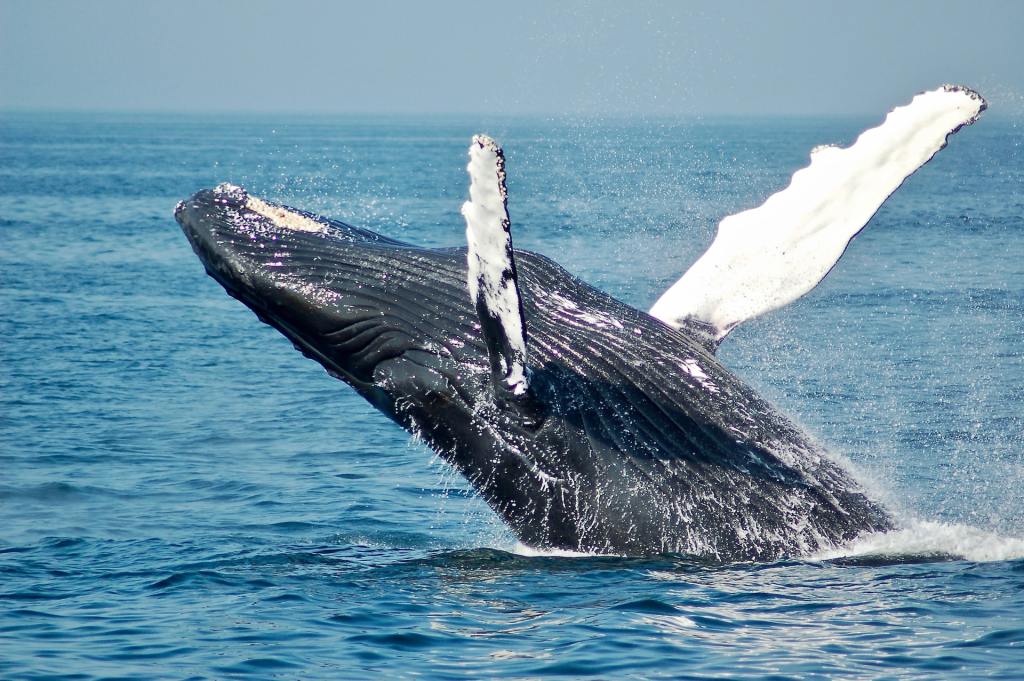
Some whales “pass their songs across oceans,” says the New York Times. Humpback whales have been studied the most extensively, but other species of whales also sing complex songs.
Although we are surrounded by ocean, I fear that we rarely give much thought to how really extraordinary the ocean is and how many wonders dwell there. Today’s story is about whales that share their song lists around the world.
Carl Zimmer writes at the New York Times, “In a study published [in August], scientists found that humpback songs easily spread from one population to another across the Pacific Ocean. It can take just a couple of years for a song to move several thousand miles.
“Ellen Garland, a marine biologist at the University of St. Andrews in Scotland and an author of the study, said she was shocked to find whales in Australia passing their songs to others in French Polynesia, which in turn gave songs to whales in Ecuador.
“ ‘Half the globe is now vocally connected for whales,’ she said. ‘And that’s insane.’
“It’s even possible that the songs travel around the entire Southern Hemisphere. Preliminary studies by other scientists are revealing whales in the Atlantic Ocean picking up songs from whales in the eastern Pacific.
“Each population of humpback whales spends the winter in the same breeding grounds. The males there sing loud underwater songs that can last up to half an hour. Males in the same breeding ground sing a nearly identical tune. And from one year to the next, the population’s song gradually evolves into a new melody.
“Dr. Garland and other researchers have uncovered a complex, language-like structure in these songs.
The whales combine short sounds, which scientists call units, into phrases. They then combine the phrases into themes. And each song is made of several themes.
“Male humpbacks sometimes change a unit in their song. Sometimes they add a new phrase or chop out a theme. The other males may then copy it. These embellishments cause the population’s song to gradually evolve, resulting in drastically different melodies from one population to the next.
“Michael Noad, a marine biologist at the University of Queensland, discovered that a population’s song can sometimes make a sudden, dramatic change. In 1996, he and his colleagues noticed that a male on the east coast of Australia had given up the local song and was now singing a tune that matched one previously sung on the west coast of the country.
“Within two years, all of the males on the east coast were singing that song. Dr. Noad’s landmark study was the first to discover this kind of cultural revolution in any animal species.
“Dr. Garland … wondered if their songs were spreading farther east across the Pacific. An opportunity to find out arrived when Judith Denkinger and Javier Oña, marine biologists at the University of San Francisco de Quito in Ecuador, offered to collaborate. They study humpback whales that breed on the coast of Ecuador.
“For their new study, Ms. Denkinger and Mr. Oña recorded humpback whales from 2016 to 2018. Over the same period, Michael Poole, a marine biologist at the Marine Mammal Research Program on the French Polynesian island of Moorea, recorded whales there. …
“In 2016 and 2017, the two populations of whales had clearly distinct songs. But in 2018, a revolution happened: The whales in Ecuador were putting French Polynesian themes in their songs. The scientists reported their findings [in] the journal Royal Society Open Science.
“Elena Schall, a postdoctoral researcher at the Alfred Wegener Institute in Bremerhaven, Germany, who was not involved in the study, said that she is seeing some similar patterns in the Atlantic Ocean. Humpback whales off the coast of Brazil and South Africa are picking up themes previously recorded off the coast of Ecuador.
“It is conceivable, Dr. Schall said, that songs flow all the way around the Southern Hemisphere. ‘It’s possible, but there’s a data gap in the Indian Ocean,’ she said. ‘I think that will definitely be the next step, if we can find enough data.’ “
More at the Times, here. Amazing to think that whales in one part of the world can “cover” the songs of whales thousands of miles away.
